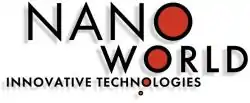 | |
| Type | Private (held by NanoWorld Holding AG) |
|---|---|
| Industry | Nanotechnology |
| Founded | Neuchâtel, Switzerland (June 23, 2000) |
| Headquarters | Neuchâtel, Switzerland |
Area served | Worldwide |
Key people | Manfred Detterbeck (Founder & CEO) |
| Products | AFM Probes AFM tips AFM cantilevers |
Number of employees | Over 50 - Jan. 2012 |
| Parent | NanoWorld Holding AG, Switzerland |
| Website | www |

NanoWorld is the global market leader for tips for scanning probe microscopy (SPM) and atomic force microscopy (AFM). The atomic force microscope (AFM) is the defining instrument for the whole field of nanoscience and nanotechnology. It enables its users in research and high-tech industry to investigate materials at the atomic scale. AFM probes are the key consumable, the “finger” that enables the scientist to scan surfaces point-by-point at the atomic scale. Consistent high quality of the scanning probes is vital for reproducible results.
NanoWorld Corporation
NanoWorld was founded in 2000 with venture capital and strong financial background in Neuchatel, Switzerland, by CEO Manfred Detterbeck, microsystems engineer, master of business and engineering. The company closely collaborates with the IMT (Institute of Microengineering at the EPFL, one of the two Swiss Federal Institutes of Technology), the CSEM (Swiss Center of Electronics and Microtechnology) and the University of Neuchâtel.[1][2]
In 2002, NanoWorld has acquired the trademark and the technology from Nanosensors (company) considered a "giant"[3] in the AFM probe industry. It is considered one of the top three Swiss nanotechnology companies with a global reputation, inspired by the invention of the atomic force microscope in the IBM research laboratories in Switzerland with a leading market position for AFM probes.[4]
Market research[5] and industry experts[6] confirm that NanoWorld today is the global market leader for AFM probes for scanning probe microscopy (SPM) and atomic force microscopy (AFM). NanoWorld's unique selling proposition is the consistent quality of its AFM probes which is essential for reproducible imaging by atomic force microscope. Its AFM probes cover the full range of atomic force microscopy and Scanning probe microscopy applications. NanoWorld AFM probes are used in research (material science, physics, life science, biology) as well as in industrial applications (semiconductor industry).
Products
- Pointprobe®[7][8] AFM Probes for Non-Contact, Contact and Force Modulation Mode have become the standard silicon etched probes in many research laboratories.
- Arrow AFM Probes[9] for Non-Contact, Contact and Force Modulation Mode and feature a unique tip shape with visibility of the tip from the top. This allows precise positioning of the tip on the area of interest.
- Arrow Ultra High Frequency AFM Probe[10][11]
- Rectangular and Triangular PNP Silicon Nitride AFM Probes[12] are available for life science or biology applications.
- Ultra-Short-Cantilevers[13] for High Speed Scanning
- NanoWorld also manufactures customized AFM probes on demand.
References
- ↑ Othenin-Girard, François (6 December 2001), "Au royome du tout petit", L'Express, Neuchâtel
- ↑ Othenin-Girard, Eric (6 December 2001), "Deux nouvelles start-up allemandes s'installent", L'AGEFI, Switzerland, p. 14
- ↑ Stevens, R. M. (2009). "New carbon nanotube AFM probe technology". Materials Today. 12 (10): 42–86. doi:10.1016/S1369-7021(09)70276-7.
- ↑ Beat Schmid (2 September 2009). "Nanotechnologie: Sorgen im Land der Zwerge". Handelszeitung, Axel Springer Schweiz AG. Retrieved 17 January 2012.
- ↑ The world market for atomic force microscopes (AFMs) and AFM Probes. Future Markets, Inc. September 2011.
- ↑ MEMS Investor Journal (March 2009). "Microfabricated diamond probes for atomic force microscopes". Retrieved 17 January 2012.
- ↑ Mourran, A.; Tartsch, B.; Gallyamov, M.; Magonov, S.; Lambreva, D.; Ostrovskii, B. I.; Dolbnya, I. P.; De Jeu, W. H.; Moeller, M. (2005). "Self-Assembly of the Perfluoroalkyl-Alkane F14H20in Ultrathin Films". Langmuir. 21 (6): 2308–2316. doi:10.1021/la048069y. PMID 15752020.
- ↑ Gritschneder, S.; Reichling, M. (2007). "Structural elements of CeO2(111) surfaces". Nanotechnology. 18 (4): 044024. Bibcode:2007Nanot..18d4024G. doi:10.1088/0957-4484/18/4/044024.
- ↑ Connolly, M. R.; Chiou, K. L.; Smith, C. G.; Anderson, D.; Jones, G. A. C.; Lombardo, A.; Fasoli, A.; Ferrari, A. C. (2010). "Scanning gate microscopy of current-annealed single layer graphene". Applied Physics Letters. 96 (11): 113501. arXiv:0911.3832. Bibcode:2010ApPhL..96k3501C. doi:10.1063/1.3327829.
- ↑ Fukuma, T.; Yoshioka, S.; Asakawa, H. (2011). "Wideband phase-locked loop circuit with real-time phase correction for frequency modulation atomic force microscopy". Review of Scientific Instruments. 82 (7): 073707. Bibcode:2011RScI...82g3707F. doi:10.1063/1.3608447. hdl:2297/29300. PMID 21806189.
- ↑ Lee, D.; Lee, H.; Lee, N. S.; Kim, K. B.; Seo, Y. (2012). "High-Speed Atomic Force Microscopy with Phase-detection". Current Applied Physics. 12 (3): 989–994. Bibcode:2012CAP....12..989L. doi:10.1016/j.cap.2011.12.024.
- ↑ Bernick, K. B.; Prevost, T. P.; Suresh, S.; Socrate, S. (2011). "Biomechanics of Single Cortical Neurons". Acta Biomaterialia. 7 (3): 1210–1219. doi:10.1016/j.actbio.2010.10.018. PMC 3062058. PMID 20971217.
- ↑ Braunsmann, C.; Schäffer, T. E. (2010). "High-speed atomic force microscopy for large scan sizes using small cantilevers". Nanotechnology. 21 (22): 225705. Bibcode:2010Nanot..21v5705B. doi:10.1088/0957-4484/21/22/225705. PMID 20453273. S2CID 13347653.